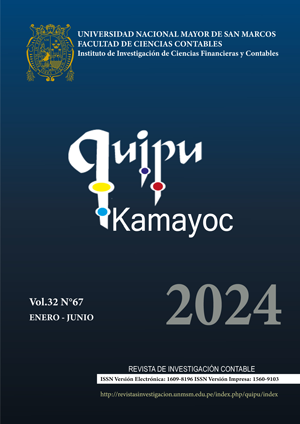Adoption of international pronouncements in the education of accountants in Peruvian universities
DOI:
https://doi.org/10.15381/quipu.v32i67.27080Keywords:
education, competencies, skills, accounting, syllabusAbstract
Objective: To analyze the extent to which the International Training Pronouncements have been incorporated into the profile of the graduate and the study plans of the Accounting program in Peruvian universities. Methods: The research was conducted using a descriptive and non-experimental design, applying content analysis techniques to the profile of the graduate and the study plans of a population and sample of 62 Peruvian universities offering degrees in Accounting, without excluding any units. Data analysis involved classifying into three categories, processed using Excel. Results: It is evident that there is a lack of timely updates in the majority of graduate profiles and study plans analyzed, as well as limited incorporation of technical competencies and professional skills required by the International Training Pronouncements. Conclusion: The absence of timely updates to graduate profiles and study plans in the Accounting program negatively impacts the provision of quality education, aligned with employer demands, as well as the insufficient incorporation of technical competencies and professional skills required by international standards.
Downloads
Downloads
Published
Issue
Section
License
Copyright (c) 2024 Oscar Alfredo Diaz-Becerra

This work is licensed under a Creative Commons Attribution 4.0 International License.
AUTHORS RETAIN THEIR RIGHTS:
a. Authors retain their trade mark rights and patent, and also on any process or procedure described in the article.
b. Authors retain their right to share, copy, distribute, perform and publicly communicate their article (eg, to place their article in an institutional repository or publish it in a book), with an acknowledgment of its initial publication in Quipukamayoc .
c. Authors retain theirs right to make a subsequent publication of their work, to use the article or any part thereof (eg a compilation of his papers, lecture notes, thesis, or a book), always indicating the source of publication (the originator of the work, journal, volume, number and date).






